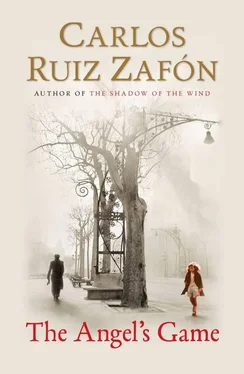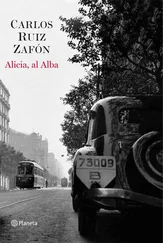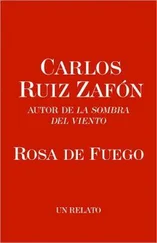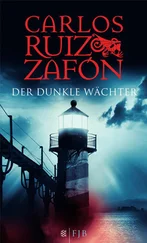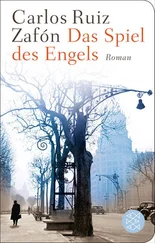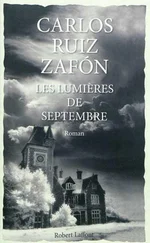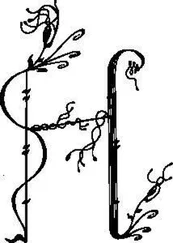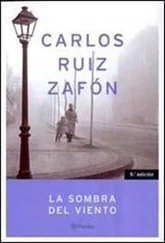The good luck my father yearned for never arrived. The only courtesy life showed him was not to make him wait too long. One night, when we reached the doors of the newspaper building to start the shift, three men came out of the shadows and gunned him down before my very eyes. I remember the smell of sulphur and the halo of smoke that rose from the holes the bullets had burned through his coat. One of the gunmen was about to finish him off with a shot to the head when I threw myself on top of my father and another one of the murderers stopped him. I remember the eyes of the gunman fixing on mine, debating whether he should kill me too. Then, all of a sudden, the men hurried off and disappeared into the narrow streets trapped between the factories of Pueblo Nuevo.
That night my father’s murderers left him bleeding to death in my arms and me alone in the world. I spent almost two weeks sleeping in the workshops of the newspaper press, hidden among Linotype machines that looked like giant steel spiders, trying to silence the excruciating whistling sound that perforated my eardrums when night fell. When I was discovered, my hands and clothes were still stained with dry blood. At first nobody knew who I was, because I didn’t speak for about a week and when I did it was only to yell my father’s name until I was hoarse. When they asked me about my mother I told them she had died and I had nobody else in the world. My story reached the ears of Pedro Vidal, the star writer at the paper and a close friend of the editor. At his request, Vidal ordered that I should be given a runner’s job and be allowed to live in the caretaker’s modest rooms, in the basement, until further notice.
Those were years in which blood and violence were beginning to be an everyday occurrence in Barcelona. Days of pamphlets and bombs that left bits of bodies shaking and smoking in the streets of the Raval quarter, of gangs of black figures who prowled about at night shedding blood, of processions and parades of saints and generals who smelled of death and deceit, of inflammatory speeches in which everyone lied and everyone was right. The anger and hatred which, years later, would lead such people to murder one another in the name of grandiose slogans and coloured rags could already be smelled in the poisoned air. The continual haze from the factories slithered over the city and masked its cobbled avenues furrowed by trams and carriages. The night belonged to gaslight, to the shadows of narrow side streets shattered by the flash of gunshots and the blue trace of burned gunpowder. Those were years when one grew up fast, and with childhood slipping out of their hands, many children already had the look of old men.
With no other family to my name but the dark city of Barcelona, the newspaper became my shelter and my world until, when I was fourteen, my salary permitted me to rent that room in Doña Carmen’s pensión. I had barely lived there a week when the landlady came to my room and told me that a gentleman was asking for me. On the landing stood a man dressed in grey, with a grey expression and a grey voice, who asked me whether I was David Martín. When I nodded, he handed me a parcel wrapped in coarse brown paper then vanished down the stairs, the trace of his grey absence contaminating the world of poverty I had joined. I took the parcel to my room and closed the door. Nobody, except two or three people at the newspaper, knew that I lived there. Intrigued, I removed the wrapping. It was the first package I had ever received. Inside was a wooden case that looked vaguely familiar. I placed it on the narrow bed and opened it. It contained my father’s old revolver, given to him by the army, which he had brought with him when he returned from the Philippines to earn himself an early and miserable death. Next to the revolver was a small cardboard box with bullets. I held the gun and felt its weight. It smelled of gunpowder and oil. I wondered how many men my father had killed with that weapon with which he had probably hoped to end his own life, until someone got there first. I put it back and closed the case. My first impulse was to throw it into the rubbish bin, but then I realised that it was all I had left of my father. I imagined it had come from the moneylender who, when my father died, had tried to recoup his debts by confiscating what little we had in the old apartment overlooking the Palau de la Música: he had now decided to send me this gruesome souvenir to welcome me to the world of adulthood. I hid the case on top of my cupboard, against the wall, where filth accumulated and where Doña Carmen would not be able to reach it, even with stilts, and I didn’t touch it again for years.
That afternoon I went back to Sempere & Sons and, feeling I was now a man of the world as well as a man of means, I made it known to the bookseller that I intended to buy that old copy of Great Expectations I had been forced to return to him years before.
‘Name your price,’ I said. ‘Charge me for all the books I haven’t paid you for in the last ten years.’
Sempere, I remember, gave me a wistful smile and put a hand on my shoulder.
‘I sold it this morning,’ he confessed.
Three hundred and sixty-five days after I had written my first story for The Voice of Industry I arrived, as usual, at the newspaper offices but found the place almost deserted. There was just a handful of journalists – colleagues who, months ago, had given me affectionate nicknames and even words of encouragement, but now ignored my greeting and gathered in a circle to whisper among themselves. In less than a minute they had picked up their coats and disappeared as if they feared they would catch something from me. I sat alone in that cavernous room, staring at the strange sight of dozens of empty desks. Slow, heavy footsteps behind me announced the approach of Don Basilio.
‘Good evening, Don Basilio. What’s going on here today? Why has everyone left?’
Don Basilio looked at me sadly and sat at the desk next to mine.
‘There’s a Christmas dinner for the staff. At the Set Portes restaurant,’ he said quietly. ‘I don’t suppose they mentioned anything to you.’
I feigned a carefree smile and shook my head.
‘Aren’t you going?’ I asked.
Don Basilio shook his head.
‘I’m no longer in the mood.’
We looked at each other in silence.
‘What if I take you somewhere?’ I suggested. ‘Wherever you fancy. Can Solé, if you like. Just you and me, to celebrate the success of The Mysteries of Barcelona.’
Don Basilio smiled, slowly nodding his head.
‘Martín,’ he said at last. ‘I don’t know how to say this to you.’
‘Say what to me?’
Don Basilio cleared his throat.
‘I’m not going to be able to publish any more instalments of The Mysteries of Barcelona.’
I gave him a puzzled look. Don Basilio looked away.
‘Would you like me to write something else? Something more like Galdós?’
‘Martín, you know what people are like. There have been complaints. I’ve tried to put a stop to this, but the editor is a weak man and doesn’t like unnecessary conflicts.’
‘I don’t understand, Don Basilio.’
‘Martín, I’ve been asked to be the one to tell you.’
Finally, he shrugged his shoulders.
‘I’m fired,’ I mumbled.
Don Basilio nodded.
Despite myself, I felt my eyes filling with tears.
‘It might feel like the end of the world to you now, but believe me when I say that deep down it’s the best thing that could have happened to you. This place isn’t for you.’
‘And what place is for me?’ I asked.
‘I’m sorry, Martín. Believe me, I’m very sorry.’
Don Basilio stood up and put a hand affectionately on my shoulder.
Читать дальше
